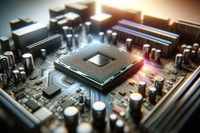Interview with Joe Fitzsimons, CEO of Horizon Quantum Computing
Joe Fitzsimons, CEO of Horizon Quantum Computing, discusses the company's approach to building software development tools for quantum computing.

Background and Unique Approach
Joe Fitzsimons, the CEO of Horizon Quantum Computing, was interviewed by Yuval Boger about the company's focus on building software development tools for quantum computing. Before starting Horizon, Joe was a professor of quantum computing for almost 20 years. The company aims to make it easier to build programs that take advantage of quantum computing by creating software development tools.
Horizon takes a unique approach by recognizing the importance of in-depth knowledge of quantum algorithms. They aim to build tools that simplify programming the systems technically and enable domain experts in various industries to leverage quantum computing. Their North Star is to accelerate classical code and make it run faster on quantum hardware. They have specifically worked on accelerating MATLAB code, but their current focus is on an integrated development environment that allows programming at a higher level of abstraction.
Advantages of Abstraction Layers
When discussing abstraction layers, Joe highlights that Horizon's approach is different. Rather than focusing on optimization algorithms and black box solutions, they prioritize building an optimizing compiler that optimizes both classical and quantum code. They have developed a complete stack that doesn't rely on existing frameworks. The goal is to optimize the code for the hardware progressively, from constructing quantum circuits to compiling down to target specific hardware. Their system allows developers to dive in at the level of abstraction they are comfortable with, whether it's working directly with the hardware, using hardware-agnostic quantum assembly code, or programming in Helium, their quantum programming language.
Joe acknowledges that abstraction layers can potentially lead to equally bad code on all hardware platforms. However, Horizon's focus on optimizing the code as it passes through each layer, getting closer to the hardware, sets them apart. By building their entire stack, they can ensure the performance and efficiency of the code without relying on external frameworks.
The Path to Quantum Advantage
Joe and Yuval discuss the transition from CPU to GPU and how it applies to the transition to quantum processors. Joe explains that Horizon has built a layered abstraction system to provide flexibility. Users can work directly with the hardware, use a hardware-agnostic layer, or program in Helium with subroutines written in C or C++. The goal is to cater to different expertise levels and allow users to contribute at the level of abstraction they are comfortable with. Whether they want to be closer to the hardware or work on higher-level quantum algorithms, Horizon's system provides the necessary flexibility.
They also touch on marketing the platform to customers. Joe emphasizes that currently, technical lead and reaching quantum advantage are critical. At this stage, Horizon's focus is on advancing the capabilities and getting to useful quantum computing as soon as possible. While they offer unique benefits like hardware independence and ease of use, the real-world quantum advantage is still on the horizon and requires progress in both hardware and algorithms.



